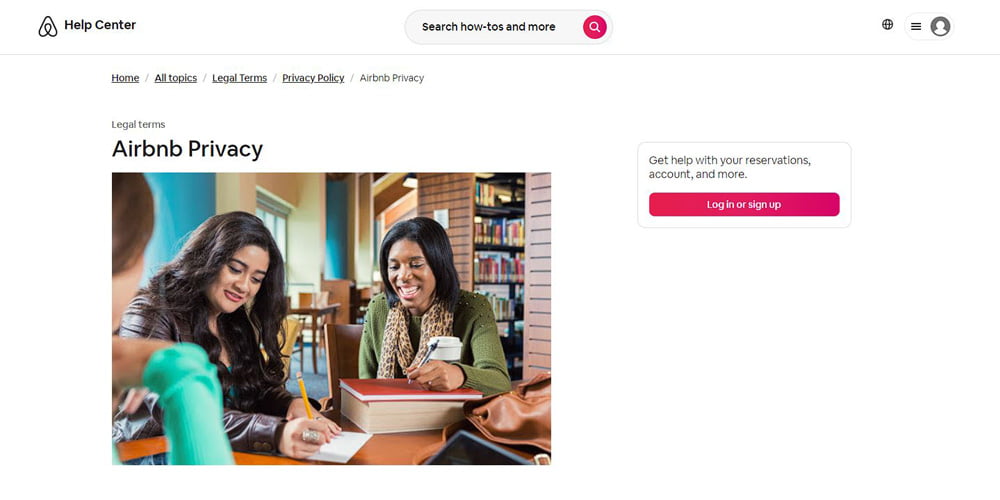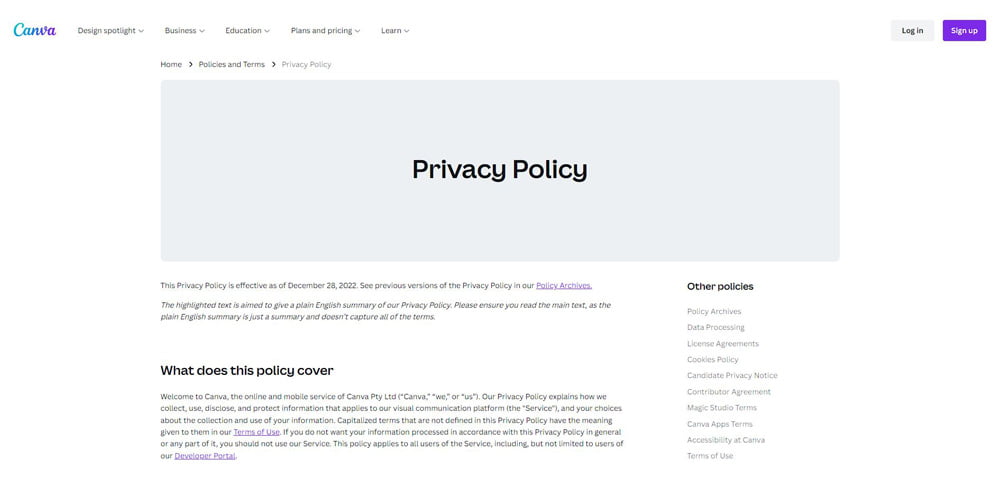If you’re going to collect personal information from users, you’re going to need a privacy policy agreement.
But what is it, and why do you need one? Data security is more important than ever due to data privacy laws.
Privacy policies are needed to keep users informed and to protect your company from liability.
This article discusses how privacy policies work and how to make a good template.

What Is a Privacy Policy and How Does it Work?
A privacy policy agreement is a legal document that states what information a business or company collects from users and for what reason.
It must disclose how personally identifiable information is collected, processed, and protected.
The kind of information a company collects from users depends on the purpose of the company. Typically, the personal information collected includes:
- Complete name
- Age
- Sex
- Email address
- Phone numbers
- Billing address
- Mailing address
- Marital status
If the company intends to collect information such as photos, location, and other information from site visitors, it should also be included in the privacy statement.
Privacy policies should be written CLEARLY and explicitly to guarantee that users understand how their personal data will be used.
Digital platforms that collect personal data are legally required to have privacy policies on their websites, mobile applications, blogs, or e-commerce sites.
Why Do You Need a Privacy Policy?
A comprehensive privacy policy can help companies build trust with their customers when they disclose what they can expect.
Privacy policies also compel companies to act transparently regarding how much access they have to customers’ personal information.
On top of that, privacy laws legally require private policy agreements to protect users’ information.
Required by Law
In the U.S., privacy laws aim to give customers the freedom and power over how companies collect and use their personal information.
It would be hard to avoid doing business in the U.S. without accounting for the following regulations:
California Online Privacy Protection Act (CalOPPA)
The California Online Privacy Protection Act (CalOPPA) of 2004 is the first state privacy legislation that requires websites and online services to include a Privacy Policy.
It was amended in 2013 to include new disclosures on tracking activities during online visits.
CalOPPA applies to all entities, whether inside or outside the U.S., that intend to collect personal information from California residents online.
This policy requires that websites have a clear and CONSPICUOUS privacy notice that discloses what information users are expected to give and to whom it will be shared.
According to CalOPPA, a Privacy Policy notice must detail the following:
- What personal information will be collected
- How the user can review and change the personal information that can be collected
- How the website operator will notify users when changes are made to the Privacy Policy
- The third-party services with whom the information will be shared
- The effective date of the policy
CalOPPA is enforced through California’s Unfair Competition Law (UCL) and is subject to actions by the Federal Trade Commission.
Children’s Online Privacy Protection Act (COPPA)
The Children’s Online Privacy and Protection Act (COPPA) protects the privacy of children under 13 years old online.
It took effect in 2000 and was later amended in 2013. It applies to all businesses and online services DIRECTED at children.
COPPA was established in response to the growing number of online platforms targeting children’s personal information without parental consent.
Under this legislation, website owners must be in compliance with the following:
- Provide a detailed privacy policy that states what users’ data will be collected
- Obtain parental consent before collecting any personal information from children under 13
- Allow parents to review or delete any collected data
- Limit the personal data gathered from children
- Strictly protect the confidentiality and integrity of any data collected from children online
COPPA applies to foreign websites as long as it is marketed to U.S. children.
Gramm–Leach–Bliley Act
The Gramm–Leach–Bliley Act, also known as the Financial Services Modernization Act of 1999, is intended for financial institutions.
This law covers businesses such as:
- Banks
- Credit unions
- Insurance companies
- Security firms
- Retailers
- Auto dealers
It requires businesses that provide financial services to disclose their data collection and data processing to their customers.
Any information gathered for financial or commercial transactions must be protected from threats or unauthorized access.
This act compels financial institutions to allow website users to decline to share their information with non-affiliated entities.
General Data Protection Regulation (GDPR)
The General Data Protection Regulation (GDPR) intends to regulate the collection and processing of personal data from individuals residing in the EU, including all member states.
How is this relevant to US-based websites?
Any business that collects data from EU citizens is still subject to GDPR rules regardless of where they are located.
Much like other privacy laws, this regulation requires a website privacy policy that details the following:
- What kind of data is collected
- What will it be used for
- Why was it collected
- How long will it be stored
- How can customers contact the company
A firm can be fined up to €10 million to €20 million, or 2% to 4% of the worldwide annual revenue from the previous financial year, if found in violation of GDPR.
Be aware of international privacy laws if you allow website visitors from different regions to protect your business from liability.
Required by Third-Party Services
Aside from legal requirements, third-party services also demand privacy policies.
Google Analytics requires privacy policy agreements from large or small businesses that intend to use their tools to collect and process data.
The privacy policy should also disclose the use of cookies and that the website uses Google Analytics.
If you intend to monetize your website traffic with Google AdSense or host Google Ads, you’ll also need to COMPLY with Google’s policies.
Several third-party services like Facebook, Twitter, and Amazon might also ask for a privacy policy agreement for your website.
Transparency Purposes
A privacy policy document gives customers control and freedom over their personal information.
Having a privacy policy shows that a company respects customer data and complies with data collection and protection regulations.
It caters to the rights of individuals to control their personal data online and the needs of businesses to process personal data for commercial purposes.
An Example of a Good Privacy Policy

What a website can require from a user varies depending on the business industry and the user’s location.
Most privacy policies contain the two most important clauses: the type of customer information to collect and for what purpose.
These clauses can be combined in a simple format on the privacy policy page.
One of the easiest ways to create a privacy policy page is by using a privacy policy generator. Simply follow the instructions, and it will generate a ready-to-use template.
A privacy policy generator typically asks questions regarding the business, what countries it’s available in, and what kind of information to collect from users.
Customize the clauses to accurately represent your business and add more depth to the privacy policy agreement.
What Clauses Are Included?
A privacy policy should describe the information to be collected, how it will be processed, and whether the website uses cookies and other tracking tools.
There are essential elements in a privacy policy agreement:
Information Collected
A privacy policy explains and confirms whether a website will collect user data and use it for certain purposes.
Many organizations include a privacy policy page, even if no user information will be collected at all.
The most commonly requested personal information from users includes:
- Full name
- Email address
- Birthdate
- Employment
The user information gathered from customers often depends on the nature of the business. For example, retail mobile apps may also ask for customers’ billing and shipping addresses.
Any user information gathered should only be used for specific purposes, so don’t collect more data than you need.
Generally, any identifying information that a business wants to collect is covered under this clause.
How the Information Is Used
This clause expounds on the purpose of the data collection and what the business will do with user data.
Depending on the business, there are numerous reasons for collecting data from users.
It is important to EXPLAIN the reason for collecting user information and for what purposes to avoid liabilities.
How the Information Is Stored and Protected
A privacy policy should include how collected information will be stored to assure users that their data are secure.
This clause should convey the fact that the company will properly handle and PROTECT user information.
It should also explain the scope of the security measures against threats, attacks, and unauthorized access.
The level of security the company can provide should match what’s written in the clause to prevent any legal disputes.
Company Contact Information
All privacy policies should include the company contact information that users can turn to if they have questions regarding the privacy policy.
It should contain email or mailing addresses, phone numbers, and other company contact details.
If the company operates in many different regions, separate contact information sections based on location can be helpful for users.
Cookies, Log Files, and Tracking
Today, many websites have a pop-up that informs users that they use cookies to enhance their website experience.
Cookies, log files, and other tools are intended to track users’ browsing information.
Since websites can share these data with third-party services, this clause should notify users how the company uses tools like cookies and log files to improve their website.
Opt-out Policy Clause
Most websites with privacy policy agreements allow users to opt-out or decline to share personal information on the website.
An opt-out clause enables users to exercise the rights granted by privacy laws like CalOPPA and GDPR.
Cookies opt-out and management can help build consumer trust as it shows that companies respect users’ privacy.
At the minimum, the two options of “accepting all cookies” and “rejecting all cookies” should be equally prominent.
Other Examples of Good Privacy Policies
It can be challenging to create a good privacy policy.
A privacy policy should protect your business from liability and inform your user base of your information-sharing practices.
Using a privacy policy generator allows you to make your privacy policy page effortlessly.
Below are good privacy policy examples that show the necessary clauses in a simple format that can help you get started:
1. Airbnb

An example of a good privacy policy is Airbnb.
Airbnb’s privacy policy page is clean and minimalistic, outlining the different sections of the agreement for readability.
It doesn’t come with bright graphics or colors that can distract users.
The privacy policy is formatted to highlight the essential information so users aren’t overwhelmed by huge blocks of text.
What’s interesting about Airbnb’s privacy policy is that users can access the previous version of the page to see what has changed.
It demonstrates transparency to users and shows the level of compliance the company follows to adhere to privacy regulations.
2. Canva

Canva is a great example of a comprehensive privacy statement that explains the details of its privacy policy practices.
The site discloses its use of additional tracking tools, such as log files and web beacons, to give users a better idea of what happens with their information.
As an online graphic website for creatives, Canva knows how to make the complex jargon of privacy policy agreements sound witty and fun.
Each section of the agreement ends with a summary that recaps key points that are accessible and understandable for users.
3. Google

The search engine giant provides no less than an extensive privacy policy page. As we know, Google analyzes billions of data to improve usability.
In their privacy policy, Google discloses that ALL the services and products they offer collect data.
That includes Chrome, Google Meet, Youtube, Gmail, and every Google product on the market.
Google’s privacy policy also includes infographics and even videos that assist users in customizing their settings.
It’s a handy way to inform users how Google uses its information and what they can do to control and manage them.
Frequently Asked Questions (FAQs)
Below are some commonly asked questions about privacy policies.
What Laws Require Me to Have a Privacy Policy?
Currently, no federal laws in the U.S. require a privacy policy except for the Children’s Online Privacy and Protection Act (COPPA).
However, there are federal and state laws that include provisions on data privacy, such as:
- The Computer Fraud and Abuse Act of 1986
- The Computer Security Act of 1997
- The Americans With Disability Act
- Virginia’s Consumer Data Protection Act (CDPA)
- Maryland’s Personal Information Protection Act (PIPA)
The California Online Privacy Protection Act (CalOPPA) is the first state law that requires a privacy policy agreement for online entities to protect California residents.
State laws from Virginia, Colorado, Connecticut, and Utah also detail several provisions for privacy practices.
Are All Businesses Required to Have a Privacy Policy?
No, not every business is required to have a privacy policy in the U.S.
Nevertheless, it’s important to have a privacy policy to comply with privacy laws around the world.
Having a good privacy policy agreement also shows that your business is transparent with users, which can help build trust.
Can I Write My Own Privacy Policy?
Yes, you can write your own privacy policy.
You don’t need to get a lawyer to draft a privacy policy agreement for websites or mobile apps.
Privacy policy generators make it easy to create templates that include the necessary clauses to explain how your business collects and processes information from users.
Conclusion
A comprehensive privacy policy should keep users informed and protect them from liability.
In the U.S., federal and state laws include provisions on privacy practices for online entities.
At the minimum, a privacy policy agreement should include what information will be collected from users and for what reason.
Having a privacy policy demonstrates that you’re transparent with managing user information, which can help build trust with users in the long run.